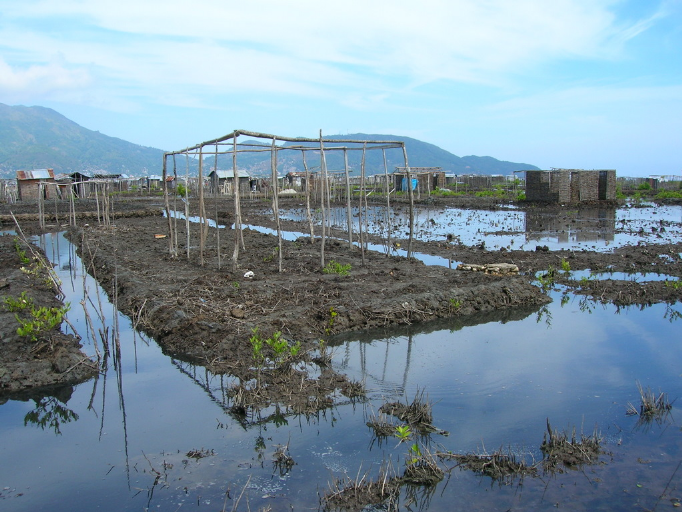6.2 Is sanitation a priority?
The question of knowing whether «sanitation is a
priority» is important as the research concentrated solely on excreta
management, which is not the main part of the Oxfam project. Interviews with
key informants helped to understand the local organisations' priorities, and
the survey did the same for people's priorities and opinions. Given the poor
state of sanitation, the implications on health are great; diarrhoea is
reported by Walden et al. (2003) as a major concern in most areas. Undoubtedly,
improving excreta disposal would lead to great improvements in health. However,
some other aspects may
be of higher importance.
6.2.1 Other priority topics
The survey has shown that handwashing is poorly done: when asked
«When do you wash your hands?»1, 21% of the respondents
quoted «before eating / preparing food»,
19% «after going to the toilet» and 7% «after
changing my baby's nappies»; 29% said they wash their hands «after
work», and 52% were either evasive or answered that they can not enough
wash their hands due to water shortages. Only 6% mentioned soap. Given the
higher impact of handwashing on faecal-oral diseases than any other form
of intervention (including toilets and improved water supply), it
would be necessary to prioritise the promotion of handwashing.
An issue which made the local engineers reluctant to work in
certain areas is the fact that the latter are considered «illegal»:
areas like the North of Petite-Anse or Mansui have been created in an unplanned
manner, due to massive emigration from rural ar- eas. They fear that any
intervention would bring more inhabitants in those areas, which present too
many hazards (flooding, erosion...) to be viable. A related problem, partic-
ularly visible in Petite-Anse, is that housing seems out of control of the
public service.
A person said he had bought his «land» (actually about
20 m2 of mud almost at sea-
level: see Figure 6.1 below) for US$ 200, from the previous
owner; a local organisation claimed to «give land for free to the
poor», but another person showed a contract with
1 The actual question in Creole was closer to «At
which points of the day do you wash your hands?»
this organisation, with a price for the land. Unless the issue of
land tenure is addressed,
any infrastructure project would face difficulties.
In low-lying land like in Shada and Petite-Anse, drinking
water comes either from handpumps if boreholes have been drilled, or from
trucks which bring water from distant boreholes. The price of water is high,
with families in Shada paying an average of 23
Gourdes (US$ 0.60) every day for water. Improving the water
system would allow those families to have more water for (hand)washing, but
would also release funds.

Figure 6.1: Housing problems in Petite-Anse.
The area in the North-East of Petite-Anse (pictured) is advancing
on the Mangrove.
6.2.2 Aspirations
The survey included the question «if you had a small
improvement in your revenue, what would do with it?», in order to evaluate
people's aspirations. It did not work as in- tended, as it highlighted people's
immediate concerns rather than long-term aspirations. The focus group
discussion tried to address this by asking what they would do if they received
a significant amount of money, and why they would do this.
In the survey, 53% of interviewees answered that they would
«use this small amount
of money to buy something in bulk and sell it, in order to
make more money»: this is supposed to be typical of the Haitian way of
thinking, much oriented towards trading according to Walden et al. (2003). 20%
answered they would improve their house, and
20% answered they would invest in a latrine, though this may have
been influenced as
the question was asked at the end of the survey.
«Education» and «more water» were also quoted on a few
occasions.
The focus group discussion surprisingly led to the same sort of
answers, with about half of the women saying that they would also «expand
their business» with this money.
They were asked «why do you want to do this», in order
to investigate their actual
inspirations. Two of them said that «they love trading,
buying and selling things», and
the rest of the participants had comments like «I want to
move in a house which actually belongs to me», or «I want to prepare
the future of my children by saving». It did not seem that sanitation was
high on their agenda.
A concern which appeared in side comments during the survey was
the lack of health and education facilities in the area of Petite-Anse, far
from the city centre where they
are all concentrated; going there can be both expensive and
time-consuming.
Rémi Kaupp
| 


